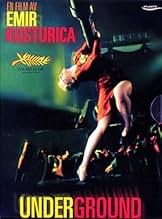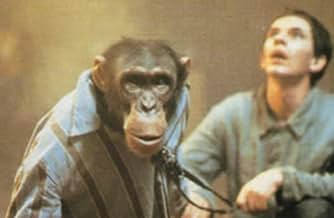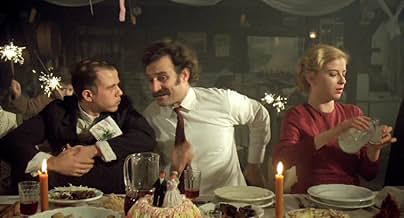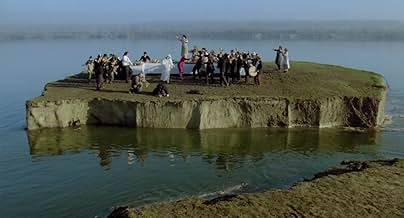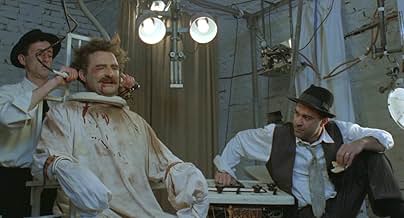IMDb-BEWERTUNG
8,0/10
62.960
IHRE BEWERTUNG
Eine Gruppe serbischer Sozialisten bereitet sich im Untergrund inmitten von Intrigen, Tragödien, Liebe und Hass auf den Krieg vor.Eine Gruppe serbischer Sozialisten bereitet sich im Untergrund inmitten von Intrigen, Tragödien, Liebe und Hass auf den Krieg vor.Eine Gruppe serbischer Sozialisten bereitet sich im Untergrund inmitten von Intrigen, Tragödien, Liebe und Hass auf den Krieg vor.
- Auszeichnungen
- 8 Gewinne & 11 Nominierungen insgesamt
Predrag 'Miki' Manojlovic
- Marko
- (as Miki Manojlovic)
- …
Srdjan 'Zika' Todorovic
- Jovan
- (as Srdjan Todorovic)
Danilo 'Bata' Stojkovic
- Deda
- (as Bata Stojkovic)
Nele Karajlic
- Falling Gypsy
- (as Dr. Nele Karajlic)
Empfohlene Bewertungen
Comical, chaotic, patriotic, satirical, philosophical, questioning, critical, ironic and many other things, throughout the plot we perceive the different layers of the plot, which in turn, requires a certain abstraction from those who watch, because in general, the characters and lived situations are just abstractions or representations.
Divided into three acts, it tells the story from the beginning to the end of Yugoslavia, through WWII, the Cold War and the dissolution of the country. We have four characters, and here, I'm going to talk a little bit about what each one represents, according to what I understand.
Crni: The Partizans, who truly love the country, fight and die for it.
Natalija: Yugoslavia itself, which at a certain moment is with Germany represented by the Official, at a certain moment with the Rebels, and a good part with the Politicians.
Marko: The corrupt, politicians, generals who, in order to stay in power, commit the greatest atrocities and betray the trust of even their brothers, friends and family.
Ivan: The Yugoslav people, who, don't understand what's happening when the war starts, much less when the war ends and Yugoslavia ends. Perhaps symbolized as on crutches, due to the country's institutional fragility.
In the first act, we have the second world war, where Natalija has love for the first three characters (Crni and German Officer, Marko), representing, the passage of domination throughout history, Crni at one point tries to date Natalija, but who does date her? Is the officer, and after the war with the Allied victory ends up staying with Marko. Also, we have a memorable scene of Ivan hitting the officer and saying, "You think you're going to have her, you filthy pig."
In the second act, we have the cold war and also the longest act of the film, I believe due to the long 40 years of the period. Right now we have The characters trapped living in a basement forced to build weapons, living under sub-human conditions, which to me means, the curtain of communism in relation to capitalism. The guns, it represents, perhaps the arms race. Marko, the politician/general who profits and lives very well from this arms trade (portrayed in Lord of War) while leaving the people living in fear of enemy domination, closed to the world that exists beyond the basement.
In the last act, we have Ivan, totally weakened from having lived through so many wars, who discovers he is being deceived all the time about the basement and the lies told as a form of control, coming across the capitalist world for the first time, having a shock to discover that your country no longer exists. In fact, the doctor who talks to him, perhaps represents NATO.
The most interesting thing for me is that the film does not seek to point out right and wrong, villains and heroes, only to portray the facts in a raw and comic way.
Anyway, I hope that my interpretation of what this film tries to tell will help other cinephiles. I'm Brazilian so I may have misunderstood the film if that's the case forgive me, I did a quick read about Yugoslav history to write this review.
Divided into three acts, it tells the story from the beginning to the end of Yugoslavia, through WWII, the Cold War and the dissolution of the country. We have four characters, and here, I'm going to talk a little bit about what each one represents, according to what I understand.
Crni: The Partizans, who truly love the country, fight and die for it.
Natalija: Yugoslavia itself, which at a certain moment is with Germany represented by the Official, at a certain moment with the Rebels, and a good part with the Politicians.
Marko: The corrupt, politicians, generals who, in order to stay in power, commit the greatest atrocities and betray the trust of even their brothers, friends and family.
Ivan: The Yugoslav people, who, don't understand what's happening when the war starts, much less when the war ends and Yugoslavia ends. Perhaps symbolized as on crutches, due to the country's institutional fragility.
In the first act, we have the second world war, where Natalija has love for the first three characters (Crni and German Officer, Marko), representing, the passage of domination throughout history, Crni at one point tries to date Natalija, but who does date her? Is the officer, and after the war with the Allied victory ends up staying with Marko. Also, we have a memorable scene of Ivan hitting the officer and saying, "You think you're going to have her, you filthy pig."
In the second act, we have the cold war and also the longest act of the film, I believe due to the long 40 years of the period. Right now we have The characters trapped living in a basement forced to build weapons, living under sub-human conditions, which to me means, the curtain of communism in relation to capitalism. The guns, it represents, perhaps the arms race. Marko, the politician/general who profits and lives very well from this arms trade (portrayed in Lord of War) while leaving the people living in fear of enemy domination, closed to the world that exists beyond the basement.
In the last act, we have Ivan, totally weakened from having lived through so many wars, who discovers he is being deceived all the time about the basement and the lies told as a form of control, coming across the capitalist world for the first time, having a shock to discover that your country no longer exists. In fact, the doctor who talks to him, perhaps represents NATO.
The most interesting thing for me is that the film does not seek to point out right and wrong, villains and heroes, only to portray the facts in a raw and comic way.
Anyway, I hope that my interpretation of what this film tries to tell will help other cinephiles. I'm Brazilian so I may have misunderstood the film if that's the case forgive me, I did a quick read about Yugoslav history to write this review.
Kusturica believes (and so do I) that countries don't fall apart but are actively ripped apart. So if you want to see a short summary of Yugoslav history 1941-92 and an artist's view of why it fell apart, this movie will tell you more about it than many political books or articles. Almost everybody is portrayed with varying degrees of guilt: the communists for lying to the people, Germany for bombing Belgrade in 1941, Germany again for supplying the weapons in 1991, all nationalists... Please do not be surprised if you read negative reviews for Kusturica has stepped on many folks' feet. Invest some time, it's one of the best films in the past 15-20 years. BTW: The soundtrack is excellent, go listen.
10pickle-7
I rarely weep during movies. At the end of this film, however, I began to weep bitterly--not because I was saddened by the story (although it is sad), but because I knew that I could never hope to create anything as beautiful as the movie I had just watched. It is this sort of film that both inspires and frightens aspiring film makers.
Underground is without a doubt, one of the very finest movies to emerge from Europe. After seeing Underground, one realizes that one has just witnessed cinema at one of it's highest levels. This movie is what "The Tin Drum" was supposed to be, and so much more. Absolutely Brilliant on all levels.
I first saw "UNDERGROUND" in 1996 about a year after it was shown
at Cannes and winning the highest honor in the world of cinema; Palme D'or was the tiniest honor that could be awarded to this eternal masterpiece ..... I have seen over 3000 movies so far and keep on watching at least 10 every week but nothing can ever replace even the memory of this unique work of art.....
I have seen all Kusturica's movies; His touch is so magical and his technique so unique, that I dare to say noone can't even imagine to be able to make another better movie And it'll remain the best movie of my life ... ETHEREAL AND OUT OF THIS WORLD .......
at Cannes and winning the highest honor in the world of cinema; Palme D'or was the tiniest honor that could be awarded to this eternal masterpiece ..... I have seen over 3000 movies so far and keep on watching at least 10 every week but nothing can ever replace even the memory of this unique work of art.....
I have seen all Kusturica's movies; His touch is so magical and his technique so unique, that I dare to say noone can't even imagine to be able to make another better movie And it'll remain the best movie of my life ... ETHEREAL AND OUT OF THIS WORLD .......
Wusstest du schon
- WissenswertesThe director's cut ran for over 320 minutes.
- Alternative VersionenThere is a 300 minutes version of this film produced for television.
- VerbindungenFeatured in Cannes... les 400 coups (1997)
Top-Auswahl
Melde dich zum Bewerten an und greife auf die Watchlist für personalisierte Empfehlungen zu.
- How long is Underground?Powered by Alexa
Details
- Erscheinungsdatum
- Herkunftsländer
- Sprachen
- Auch bekannt als
- Once Upon a Time There Was a Country
- Drehorte
- Plovdiv, Bulgarien(Tunels)
- Produktionsfirmen
- Weitere beteiligte Unternehmen bei IMDbPro anzeigen
Box Office
- Budget
- 14.000.000 $ (geschätzt)
- Bruttoertrag in den USA und Kanada
- 171.082 $
- Weltweiter Bruttoertrag
- 182.134 $
- Laufzeit2 Stunden 50 Minuten
- Farbe
- Sound-Mix
- Seitenverhältnis
- 1.85 : 1
Zu dieser Seite beitragen
Bearbeitung vorschlagen oder fehlenden Inhalt hinzufügen



